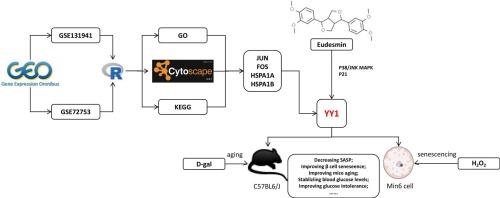基于生物信息学鉴定和验证胰腺β细胞衰老过程中的关键调控转录因子YY1。
IF 3.9
引用次数: 0
摘要
胰岛β细胞的衰老与糖耐量受损等多种疾病密切相关,但其潜在的调控机制仍不清楚。在这项研究中,我们从 GEO 公共数据库中筛选了年轻和衰老小鼠胰腺β细胞的高通量测序数据。利用生物信息学技术,我们发现了胰岛衰老过程中的关键调控因子 YY1。在 D-gal 诱导的小鼠胰腺衰老模型和 H2O2- 诱导的 MIN6 细胞衰老模型中,我们观察到 YY1 的表达明显下降。此外,在体内和体外模型中,我们发现 YY1 激动剂 eudesmin(EDN)能改善小鼠的葡萄糖不耐受,缓解胰腺β细胞的衰老,并下调细胞周期蛋白 P21 的表达。从机理上讲,我们发现 EDN 可抑制衰老细胞中的 P38/JNK MAPK 通路。总之,我们的研究证实了转录因子 YY1 在胰岛β细胞衰老过程中的调控作用。这一发现可能为胰腺衰老相关疾病(如糖耐量受损或糖尿病)的临床治疗提供一种新方法。本文章由计算机程序翻译,如有差异,请以英文原文为准。

Identifying and validating the key regulatory transcription factor YY1 in the aging process of pancreatic beta cells based on bioinformatics
The aging of pancreatic beta cells is closely associated with various diseases, such as impaired glucose tolerance, yet the underlying regulatory mechanisms remain unclear. In this study, we screened young and aged mouse pancreatic beta cells' high-throughput sequencing data from the GEO public database. Utilizing bioinformatics techniques, we identified the key regulatory factor YY1 in the aging process of pancreatic islets. We observed a significant decrease in the expression of YY1 in a D-gal-induced mouse model of pancreatic aging and an H2O2-induced MIN6 cell model of aging. Moreover, both vivo and vitro models, we found that the YY1 agonist eudesmin (EDN) improved glucose intolerance in mice, alleviated aging of pancreatic beta cells, and downregulated the expression of cell cycle protein P21. Mechanistically, we discovered that EDN inhibited the P38/JNK MAPK pathway in aging cells. In summary, our study confirms the regulatory role of the transcription factor YY1 in the aging process of pancreatic beta cells. This finding may provide a new approach for the clinical treatment of pancreatic aging-related diseases such as impaired glucose tolerance or diabetes.
求助全文
通过发布文献求助,成功后即可免费获取论文全文。
去求助
来源期刊

Experimental gerontology
Ageing, Biochemistry, Geriatrics and Gerontology
CiteScore
6.70
自引率
0.00%
发文量
0
审稿时长
66 days
 求助内容:
求助内容: 应助结果提醒方式:
应助结果提醒方式:


